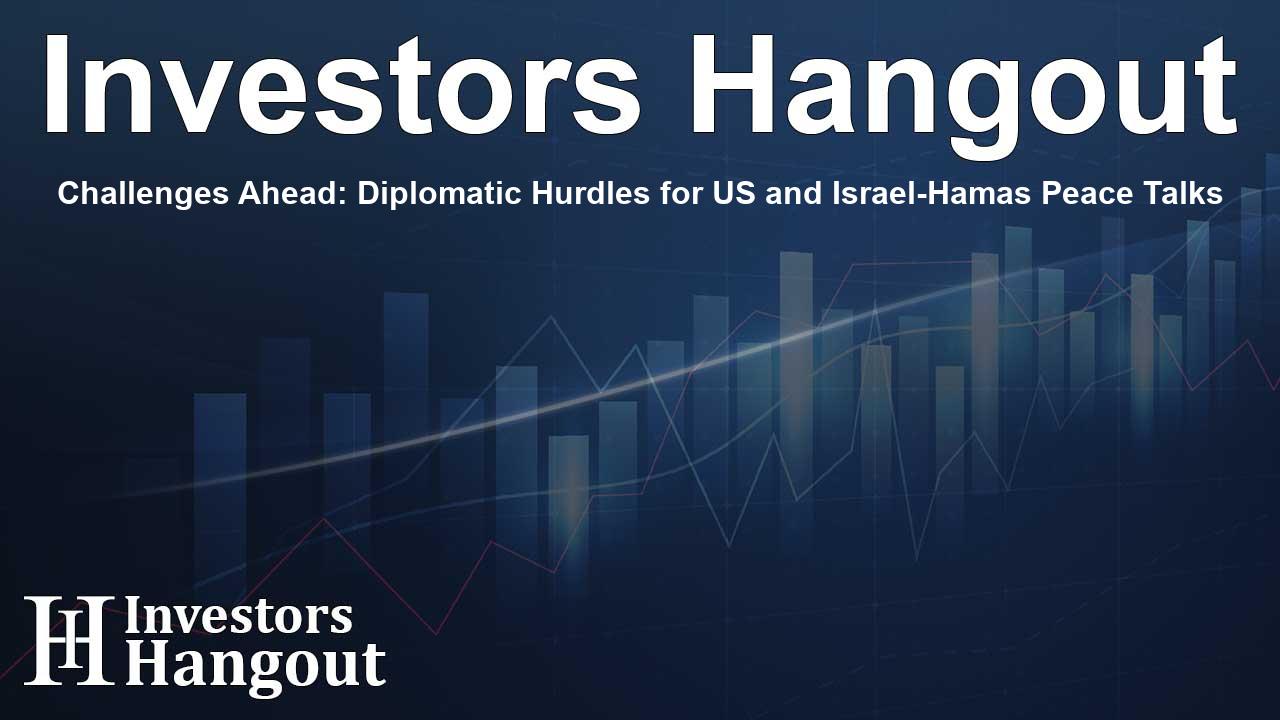Challenges Ahead: Diplomatic Hurdles for US and Israel-Hamas Peace Talks

Challenges Ahead for U.S. and Israel-Hamas Peace Talks
Recently, senior U.S. officials have indicated skepticism regarding the likelihood of a cease-fire and a hostage-release agreement between Israel and Hamas before the end of President Joe Biden's term. The complexities surrounding this issue continue to present significant diplomatic challenges.
Current Situation and Negotiations
Despite extensive negotiations over recent months, it appears the White House has recognized that both Israel and Hamas remain at an impasse. According to officials, one major point of contention lies in the disparity between Palestinian prisoners and hostages held by Hamas. This, combined with escalating tensions involving Hezbollah, is creating substantial barriers to reaching an agreement.
Statements from U.S. Officials
A prominent U.S. official articulated the current sentiment by stating, "No deal is imminent" and expressed doubt about the feasibility of achieving a resolution. This lack of progress has led to frustration among involved parties, particularly the families of American hostages.
Efforts for Hostage Release
National Security Adviser Jake Sullivan recently met with families of the American hostages, affirming that their release is a priority for the administration. However, many families have voiced their concerns over the stagnation of discussions, highlighting an urgent need for action.
Broader Implications
Secretary of State Antony Blinken recently delivered a speech in France, urging all parties to exercise restraint in view of the escalating conflict. Meanwhile, National Security Council spokesman John Kirby categorized the prospects for a feasible deal as "daunting," reflecting the concerns of many within the administration.
Regional Reactions and Global Perspectives
Compounding these difficulties, Hezbollah leader Hassan Nasrallah has characterized recent developments as a "declaration of war." This assertive stance adds urgency to the situation, as it complicates diplomatic efforts to broker peace in a region already marred by complexity.
Involvement of Key Mediators
The Biden administration is actively collaborating with mediators such as Egypt and Qatar in hopes of breaking the deadlock. These nations are seen as crucial players in facilitating dialogue between conflicting parties, potentially paving the way for a resolution.
International Concerns and Calls for Action
The conflict has attracted international scrutiny, with various countries voicing their opinions. Notably, concerns have been raised regarding U.S. involvement, with some nations emphasizing the obligation to address the humanitarian needs arising from the conflict. China, for example, has criticized the U.S. role, claiming that it has hindered ceasefire efforts and called for the end of Israel's occupation of Palestinian territories.
Domestic Reactions in Israel
Amidst these diplomatic efforts, Israel is experiencing significant domestic unrest, with large-scale protests erupting. These protests have been fueled by calls for an immediate ceasefire following reported deaths of hostages in Gaza. Activists are urging Prime Minister Benjamin Netanyahu to prioritize the release of remaining captives.
Conclusion and Future Outlook
The journey toward achieving a cease-fire and resolving the hostage situation between Israel and Hamas is fraught with challenges. The uncertainty surrounding these negotiations raises questions about the future of U.S. involvement in facilitating peace in the region. With the end of Biden's term looming on the horizon, the race against time adds pressure to a complex and sensitive situation.
Frequently Asked Questions
What are the current obstacles in Israel-Hamas negotiations?
The main obstacles include the disparity between Palestinian prisoners and Hamas-held hostages, along with recent escalations involving Hezbollah.
How are U.S. officials reacting to the peace talks?
U.S. officials express skepticism regarding the likelihood of a deal being reached before Biden's term ends, citing the lack of imminent progress.
What role does Jake Sullivan play in this context?
Jake Sullivan serves as the National Security Adviser and has met with families of American hostages, emphasizing that their release is a priority.
What are the international reactions to the conflict?
International scrutiny has increased, with countries like China condemning U.S. actions and calling for an end to the occupation of Palestinian territories.
What is happening within Israel regarding public opinion?
In Israel, there have been large protests demanding an immediate ceasefire, particularly in light of recent hostage deaths.
About Investors Hangout
Investors Hangout is a leading online stock forum for financial discussion and learning, offering a wide range of free tools and resources. It draws in traders of all levels, who exchange market knowledge, investigate trading tactics, and keep an eye on industry developments in real time. Featuring financial articles, stock message boards, quotes, charts, company profiles, and live news updates. Through cooperative learning and a wealth of informational resources, it helps users from novices creating their first portfolios to experts honing their techniques. Join Investors Hangout today: https://investorshangout.com/
Disclaimer: The content of this article is solely for general informational purposes only; it does not represent legal, financial, or investment advice. Investors Hangout does not offer financial advice; the author is not a licensed financial advisor. Consult a qualified advisor before making any financial or investment decisions based on this article. The author's interpretation of publicly available data shapes the opinions presented here; as a result, they should not be taken as advice to purchase, sell, or hold any securities mentioned or any other investments. The author does not guarantee the accuracy, completeness, or timeliness of any material, providing it "as is." Information and market conditions may change; past performance is not indicative of future outcomes. If any of the material offered here is inaccurate, please contact us for corrections.